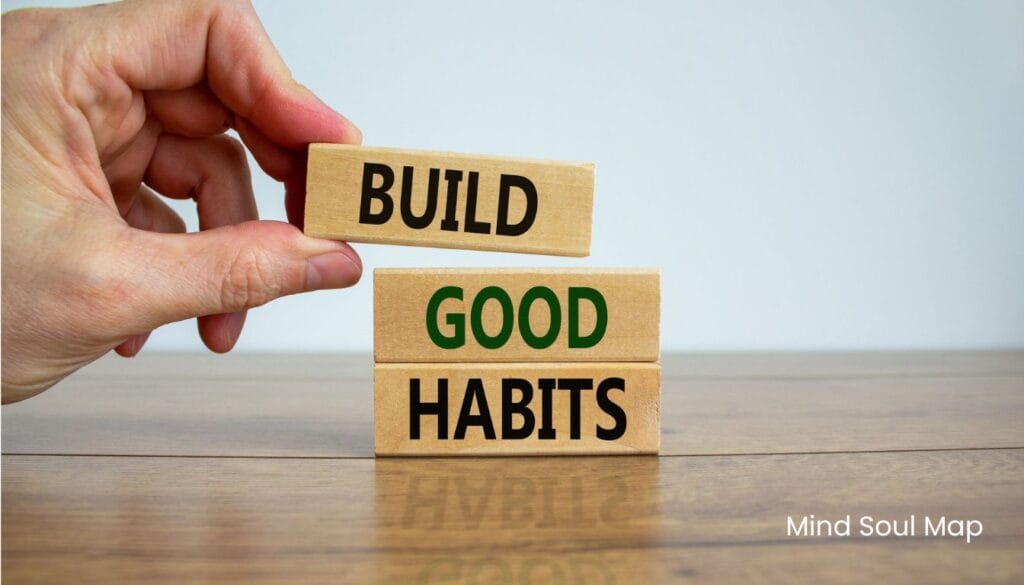Have you ever tried to break a bad habit or start a new one? You might have felt stuck and frustrated. The idea that it takes 21 days to form a habit is not true. Research shows that forming habits can take weeks to months, depending on many factors.
Changing habits is hard, and we all want a quick fix. But, building lasting habits needs patience, consistency, and understanding the science behind it. In this article, we’ll look at how long it really takes to form a habit. We’ll also talk about what affects it and how to succeed in changing for the better.
Table of Contents
Understanding Habit Formation: Beyond the 21-Day Myth
The idea that it takes 21 days to form a new habit is a myth. Habit formation is complex and can take much longer. Research shows it can take from 18 days to over 250 days to make a behavior automatic.
Origins of the 21-Day Theory
The 21-day habit formation myth started with Maxwell Maltz’s 1960 book “Psycho-Cybernetics.” Maltz noticed patients took about 21 days to get used to their new looks after plastic surgery. This idea was then applied to other areas of life, without scientific proof, making many believe it takes just three weeks to form a new habit.
Why the Myth Persists
The 21-day myth is appealing because it seems achievable. The idea of forming a new habit in just three weeks is easy to grasp. But, this oversimplifies the science behind habit formation.
What Science Actually Says
A 2009 study by Phillippa Lally showed the 21-day myth is wrong. Lally’s study found it takes about 66 days for a behavior to become automatic. But, the time can vary greatly, from 18 days to 254 days.
Many factors influence how long it takes to form a habit. These include the complexity of the behavior, personal motivation, and environmental and social support. Knowing the science behind habit formation is key to creating lasting habits.
The Real Timeline: From Weeks to Months
Many think it takes 21 days to form a habit. But, studies show it can take much longer. A 2009 study found habits take between 18 to 254 days, with an average of 66 days.
Research on gym-goers showed it takes at least four times a week for six weeks to form an exercise habit. More recent studies suggest simple habits like handwashing can form in weeks. But, complex habits like regular exercise can take up to six months to become automatic.
The time it takes to form a habit varies. It depends on the behavior’s complexity, individual differences, and the environment. While some long-term habits may take months, consistency and the right strategies can speed up the habit development process.
“Successful individuals like Warren Buffet and endurance champion David Goggins often have one common factor: the presence of good habits.”
The habit timeline is not the same for everyone. By understanding how habits form, you can tailor your approach. This way, you can set realistic expectations and cultivate the habits for your long-term success.
Factors That Influence How Long It Takes to Form a Habit
The time it takes to form a habit varies. It can be from 18 to 254 days, with an average of 66 days. This shows how different factors can affect the process.
Complexity of the Behavior
The complexity of the habit you want to form matters a lot. Simple habits like drinking water or taking a daily vitamin are quicker to form. But, more complex habits like regular exercise take longer because they require more steps and mental effort.
Individual Differences
Your personal traits, like motivation and past experiences, also matter. Some people might find it easier to form new habits than others. This is because of their unique characteristics.
Environmental Conditions
The environment where you try to form a habit is also important. Things like social support and the physical surroundings can help or hinder the process. The presence of cues or triggers can also play a role.
So, how long it takes to form a habit really depends on the individual. Knowing the key factors can help you set realistic goals for your behavioral changes.
| Factor | Impact on Habit Formation |
|---|---|
| Behavior Complexity | Simple habits form faster than complex ones. |
| Individual Characteristics | Motivation, personality, and past experiences influence habit adoption. |
| Environmental Conditions | Social support, physical cues, and triggers can facilitate or hinder habit formation. |
“The range in days needed to form a new habit highlights the personalized nature of habit formation influenced by behavior, context, and individual characteristics.”
Simple vs. Complex Habits: A Comparison
Forming simple habits is much faster than complex ones. Simple habits, like drinking water with lunch or flossing daily, can form in weeks. Complex habits, like regular exercise or learning a new skill, take months or even years.
Simple habits need less mental effort and fit easily into your day. Complex habits, however, require more planning and effort to become automatic.
For complex habits, setting clear goals is key. Consistency in training is also vital. Choosing the right cues and triggers is crucial for breaking down big goals into smaller steps.
The “21-day rule” for habit formation is a myth. Simple habits can form in 1-2 weeks, while complex ones take months. Knowing this can help you set realistic goals for new habits.
“Forming habits can take almost a year to establish and may require sustained effort over weeks or months.”
Every person’s journey to forming habits is unique. Understanding the differences between simple and complex habits helps you create better strategies for change.

The Science Behind How to Form a Habit
Creating a new habit is a complex process that involves your brain. It starts with the formation of neural pathways, which are like highways in your brain. These pathways get stronger with each repetition, making the action feel automatic.
Neural Pathways and Habit Formation
The basal ganglia is a key area in your brain for habits. It helps with movement and habitual behaviors. The corticostriatal pathway connects it to the prefrontal cortex, crucial for habits.
The Role of Repetition
Repeating a behavior strengthens the neural pathways involved. This is the “habit loop,” where a behavioral trigger leads to a routine. Over time, this routine becomes automatic, needing less effort.
Behavioral Triggers and Cues
Finding and using behavioral triggers helps form habits. These can be environmental or internal. By linking your behavior to a consistent trigger, it’s more likely to stick. Positive reinforcement and rewards also help.
Knowing how habits form can help you make lasting changes. By understanding neural processes and the role of repetition and triggers, you can build habits for success.
Creating Habit-Friendly Environments
Creating a supportive habit environment is key to forming and keeping new habits. Your lifestyle changes will stick better when your surroundings help. This means your physical and social spaces should support the habits you want to build.
First, check out your current space. Look for things that might stop you from starting your new habit. For example, not having junk food around and having healthy snacks ready can help you eat better. Also, having your workout gear where you can see it can remind you to exercise.
Use technology to help you. Many apps and devices are made to track your progress and help with habit formation. A fitness tracker, for instance, can show you how active you are and encourage you to move more.
- Put visual or tactile habit cues in your space to remind you of what to do.
- Change your app settings to reduce distractions and keep your focus on your goals.
- Use tools that track your screen time to help you make better choices about digital use.
Also, be around people who support your habits. Talk to friends, family, or online groups who share your goals. Their support can really help you stick to your new habits.
| Habit Environment Strategies | Benefits |
|---|---|
| Removing temptations and obstacles | Makes it easier to do what you want and less hard to resist bad habits |
| Placing visual and tactile cues | Reminds you to do your habits in a strong way |
| Leveraging technology and apps | Gives you feedback and encouragement to keep going |
| Engaging with a supportive social network | Helps you stay on track and feel motivated |
By planning your habit environment carefully, you can make it easier to succeed with your lifestyle changes and new habits.

The Role of Consistency in Habit Development
Consistency is key to forming good habits. Making a habit a daily routine strengthens your brain’s pathways. This makes the behavior automatic. But, don’t get discouraged by occasional setbacks.
Daily Practice Benefits
Doing your desired habit every day, even a little, brings big benefits. Missing a day or two doesn’t hurt your long-term progress. The goal is to build a habit through daily rituals, not to be perfect.
- Consistent daily practice strengthens neural pathways, solidifying the habit.
- Developing a routine helps make the behavior automatic over time.
- Daily rituals can boost motivation and accountability for habit formation.
Managing Setbacks
Setbacks are part of building habits. If you experience a lapse in your habit practice, be kind to yourself. Have a plan to get back on track fast. Don’t think you have to do it all perfectly.
- Reassess your strategies and make adjustments as needed.
- Celebrate small wins and recommit to your habit consistency.
- Seek support from others to help you overcome setbacks and stay motivated.
Being consistent and flexible is crucial for lasting habits. By sticking to daily routines and handling setbacks, you can make your habits a part of who you are.
Tracking Progress and Measuring Success
Keeping an eye on your progress is key to making new habits stick. By tracking your habit tracking efforts, you can see how far you’ve come. This helps keep you motivated. There are many ways to do this, from simple paper trackers to advanced habit success apps.
When you’re tracking your behavioral changes, focus on being consistent, not perfect. Aim for small wins and celebrate them. This will help keep you going and make your new habits last longer.
- Use SMART (Specific, Measurable, Achievable, Relevant, Time-bound) goals to track your progress effectively.
- Identify Key Performance Indicators (KPIs) that help you evaluate your results and assess your progress towards your goals.
- Utilize both quantitative metrics (objective numerical data) and qualitative metrics (subjective insights) to paint a comprehensive picture of your habit tracking and habit success.
- Break down your larger goals into smaller, manageable milestones and tasks to maintain a sense of steady progress.
- Regularly check in with accountability partners or support groups to receive feedback and stay motivated.
- Leverage visual representations like scorecards, whiteboards, or goal-tracking apps to monitor your progress and celebrate your wins.
The path to lasting habits is a long one. By regularly tracking your progress and celebrating your successes, you’re on the right track. You’ll be well on your way to making lasting behavioral changes and building strong habits.
Common Obstacles in Habit Formation
Starting new habits can be tough. Lack of motivation is a big hurdle. Without a strong reason to change, it’s easy to fall back into old ways. Unrealistic goals can also lead to disappointment and frustration.
Environmental barriers can also get in the way. Busy lives, distractions, or unsupportive places can make it hard to stick to new habits. To overcome this, try breaking habits into smaller steps or making them more fun.
Beliefs and attitudes matter too. If you doubt your ability to change or don’t see the habit’s value, it’s harder to start. Changing these beliefs and adopting a growth mindset can help.
Beating these obstacles needs flexibility and a deep understanding of the challenges. With patience, self-compassion, and a willingness to learn, you can overcome them. This way, you can successfully add new habits to your life.
| Obstacle | Impact | Strategies to Overcome |
|---|---|---|
| Lack of Motivation | Difficulty sustaining effort and commitment to the new habit |
|
| Unrealistic Expectations | Feelings of frustration and discouragement when progress is slow |
|
| Environmental Barriers | Difficulty maintaining consistency and establishing new routines |
|
| Limiting Beliefs and Attitudes | Undermining self-confidence and perceived ability to change |
|
“The greatest weapon against stress is our ability to choose one thought over another.” – William James
Understanding and tackling common obstacles in habit formation can help you succeed. The journey may face ups and downs, but with determination and a willingness to learn, you can change your habits for the better.
Building Sustainable Long-Term Habits
To make habits last, you need strong support and ways to stay accountable. Friends, family, or online groups can offer support. Using apps or regular check-ins can help keep you on track.
Support Systems
Having a network that backs you up is key. Surround yourself with people who share your goals. This could be fitness friends or online hobby groups. They keep you motivated and on track.
Accountability Methods
Accountability can change the game. This might mean regular meetings with a friend or using apps. These tools help you stay focused and overcome challenges.
Seeing the habit as part of who you are also helps. When it feels natural, it’s easier to keep it up.
Creating lasting habits takes time and effort. Begin with small steps and clear goals. With the right support and accountability, your habits can last forever.
Conclusion
Creating a habit is a complex process that differs for everyone. The idea that habits form in 21 days is not true. Research shows it can take weeks to months to form a habit.
Success in forming habits comes from being consistent and creating supportive environments. Tracking your progress and overcoming obstacles also helps. Building sustainable systems is key.
Understanding the science behind habits can help you make lasting changes. By aligning your habits with your strengths and interests, you’re more likely to succeed. This makes new habits a part of your daily routine.
Remember, building a habit is a journey, not a quick fix. It takes patience, commitment, and flexibility. Celebrate your progress to unlock the power of habit formation and make lasting changes in your life.
FAQ
How long does it take to form a habit?
The idea that it takes 21 days to form a habit is not true. Studies show that it can take anywhere from a few weeks to several months. A 2009 study found habits form in 18 to 254 days, averaging 66 days.
What is the origin of the 21-day habit formation myth?
The myth started with Maxwell Maltz’s 1960 book “Psycho-Cybernetics.” He noticed patients took about 21 days to adjust after plastic surgery. This idea spread to other areas of life without scientific proof.
Why does the 21-day myth persist?
The myth seemed believable and achievable. But, a 2009 study by Phillippa Lally proved it wrong. It showed habit formation is complex and varies greatly.
What does science actually say about the timeline for habit formation?
Science says habit formation times vary widely. A 2009 study found habits form in 18 to 254 days, averaging 66 days. Recent research shows simple habits like handwashing can form in weeks. But, complex habits like regular exercise may take up to six months.
What factors influence the time it takes to form a habit?
Many factors affect habit formation time. These include the behavior’s complexity, individual motivation, and the environment. Social support and cues also play a role.
What is the difference in formation time between simple and complex habits?
Simple habits, like drinking water with lunch, form quickly, often in weeks. But, complex habits, like regular exercise, take longer, sometimes months.
How does habit formation work at a neurological level?
Habit formation strengthens neural pathways in the brain. Repetition makes these pathways automatic. Triggers and cues are key in this process.
What role does the environment play in habit formation?
A supportive environment is crucial. It should encourage the new habit and avoid obstacles.
Why is consistency important in habit formation?
Consistency is vital. Daily practice strengthens pathways and speeds up habit formation. Setbacks are normal and shouldn’t stop you.
How can tracking progress help with habit formation?
Tracking progress helps a lot. It shows your efforts and keeps you motivated. You can use paper trackers or apps for this.
What are some common obstacles in habit formation?
Common obstacles include lack of motivation and environmental barriers. To overcome these, you need strategies and to address underlying beliefs.
How can you build sustainable long-term habits?
For lasting habits, create strong support systems and accountability. Also, integrate the habit into your identity and values.


3 thoughts on “How Long Does it Take to Form a Habit?”